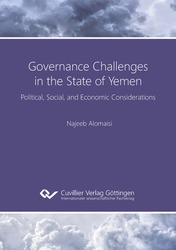| Departments | |
|---|---|
| Book Series (97) |
1381
|
| Nachhaltigkeit |
3
|
| Gesundheitswesen |
1
|
| Humanities |
2370
|
| Medienwissenschaften | 16 |
| Theology | 57 |
| Philosophy | 102 |
| Law | 423 |
| Economics | 852 |
| Social sciences | 417 |
| Sports science | 48 |
| Psychology | 233 |
| Educational science | 190 |
| History | 183 |
| Art | 111 |
| Cultural studies | 166 |
| Literary studies | 117 |
| Linguistics | 88 |
| Natural Sciences |
5407
|
| Engineering |
1796
|
| Common |
98
|
|
Leitlinien Unfallchirurgie
5. Auflage bestellen |
|
Advanced Search
Governance Challenges in the State of Yemen (English shop)
Political, Social, and Economic Considerations
Najeeb H. Alomaisi (Author)Preview
Extract, PDF (200 KB)
Table of Contents, PDF (210 KB)
The concept of governance has gained greater attention from scholars and international organizations as a foundation for growth, particularly to lift developing countries from dire situations and bring more prosperity to the developed world. However, according to the World Bank, Yemen is considered one of the most poorly governed countries in the world. This poor evaluation motivated this study into the challenges to good governance in Yemen and the author’s desire to demonstrate the importance of governance in addressing Yemen’s current critical situation. Despite the extensive literature published on governance, works on Yemen are rare, and there is barely any academic work on governance challenges. This relatively small body of literature encouraged me to examine in depth the obstacles to governance in Yemen.
This study builds a theoretical framework to examine the difficulties of establishing good governance in Yemen by exploring the critical social and institutional challenges vital for good governance. This dissertation poses the following question: What are the challenges to good governance in Yemen, and why and how do they hamper good governance in Yemen? To address this research question, I adopted a qualitative interpretive approach. This analysis is based on information gathered from a variety of sources, including mainly semi-structured formal and informal interviews, observations, governance and government materials, such as international reports, governance manuals, websites, social media posts, and related videos, among others. The findings expose nine dimensions and 21 constructed themes, which scrutinize how and why governance is hampered in Yemen. Overall, this study introduces numbers of contributions to the governance literature by identifying social and institutional challenges and showing how they influence good governance and state-building in the Yemen context. More specifically, this Ph.D. contributes to identifying and discussing the issues that have been ignored in governance literature, such as religion, tribes, supremacy, and the Qat phenomenon, all of which applying the case of Yemen. Finally, the study makes some recommendations for stakeholders to consider, particularly for post-conflict time to aid in post-war reconstruction. This moment is an opportunity to build a state by addressing the current governance challenges, and some suggestions include a transitional phase, the introduction of constitutional and legal reforms, with youth and local community engagement.
| ISBN-13 (Hard Copy) | 9783736977181 |
| ISBN-13 (eBook) | 9783736967182 |
| Final Book Format | A5 |
| Language | English |
| Page Number | 240 |
| Lamination of Cover | glossy |
| Edition | 1. |
| Publication Place | Göttingen |
| Place of Dissertation | Speyer |
| Publication Date | 2023-01-03 |
| General Categorization | Dissertation |
| Departments |
Economics
|
| Keywords | Governance, institutional challenges, education, fragile judiciary, myopic democracy, reactive leadership, State tribalism, Islamism, supremacy, instability, Gioia method, poor education outcomes, politicizing education, judiciary ineffectiveness, judiciary lacks independence, myopic democracy, primitive institutions, patronage-based leadership, reactive theocratic leadership, religious superiority, clergy populism, intermarriage of religion and politics, tribal ascendancy, tribal exploitation, wasting resources, Qat non-compliance culture, state absence, sin of supremacy, external intervention, societal accountability deficiency, state capture, institutionalization of corruption, Regierungsführung, institutionelle Herausforderungen, Bildung, fragile Justiz, kurzsichtige Demokratie, reaktive Führung, staatlicher Tribalismus, Islamismus, Vorherrschaft, Instabilität, Gioia-Methode, schlechte Bildungsergebnisse, Politisierung der Bildung, richterliche Ineffektivität, mangelnde Unabhängigkeit der Justiz, kurzsichtige Demokratie, primitive Institutionen, Patronage-basierte Führung, reaktive theokratische Führung, religiöse Überlegenheit, Geistlicher, Populismus, Mischehe von Religion und Politik, Stammesüberlegenheit, Stammesausbeutung, Ressourcenverschwendung, Qat-Nichteinhaltungskultur, Staatsabwesenheit, Sünde der Vorherrschaft, externe Intervention, gesellschaftliche Rechenschaftspflicht, Mangel, staatliche Gefangennahme, Institutionalisierung von Korruption |








